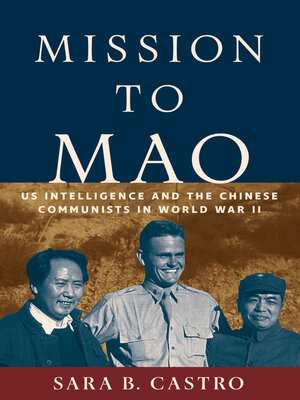Mission to Mao
ebook ∣ US Intelligence and the Chinese Communists in World War II · Georgetown Studies in Intelligence History
By Sara B. Castro

Sign up to save your library
With an OverDrive account, you can save your favorite libraries for at-a-glance information about availability. Find out more about OverDrive accounts.
Find this title in Libby, the library reading app by OverDrive.



Search for a digital library with this title
Title found at these libraries:
| Library Name | Distance |
|---|---|
| Loading... |
An innovative history of US intelligence officers on the ground and the first official contacts between the United States and the Chinese Communist Party
From 1944 to 1947, the United States planted a liaison mission in the headquarters of Chinese Communist forces behind the lines. Nicknamed the "Dixie Mission," for its location in "rebel" territory, it was an interagency delegation that included intelligence officers from the Office of Strategic Services (OSS), the US Army, and the State Department.
Mission to Mao is a social history of the OSS officers in the field that reveals the weakness of US intelligence diplomacy in the 1940s. Drawing on over 14,000 unpublished records from five archives as well as white papers and memoirs from the participants, Sara B. Castro demonstrates how the US intelligence officers in China clashed with political appointees and Washington over the direction of the US relationship with the Chinese Communists. Interagency and political conflicts erupted over assessments of Communist capabilities and whether or not the mission would later involve operations with the Communists. Castro shows how potential benefits for the war effort were thwarted by politicization, rivalries, and the biases of US intelligence officials.
Mission to Mao is a fresh look at US intelligence in WW II China and takes readers beyond the history of "China Hands" versus American anticommunists, introducing more nuance.







